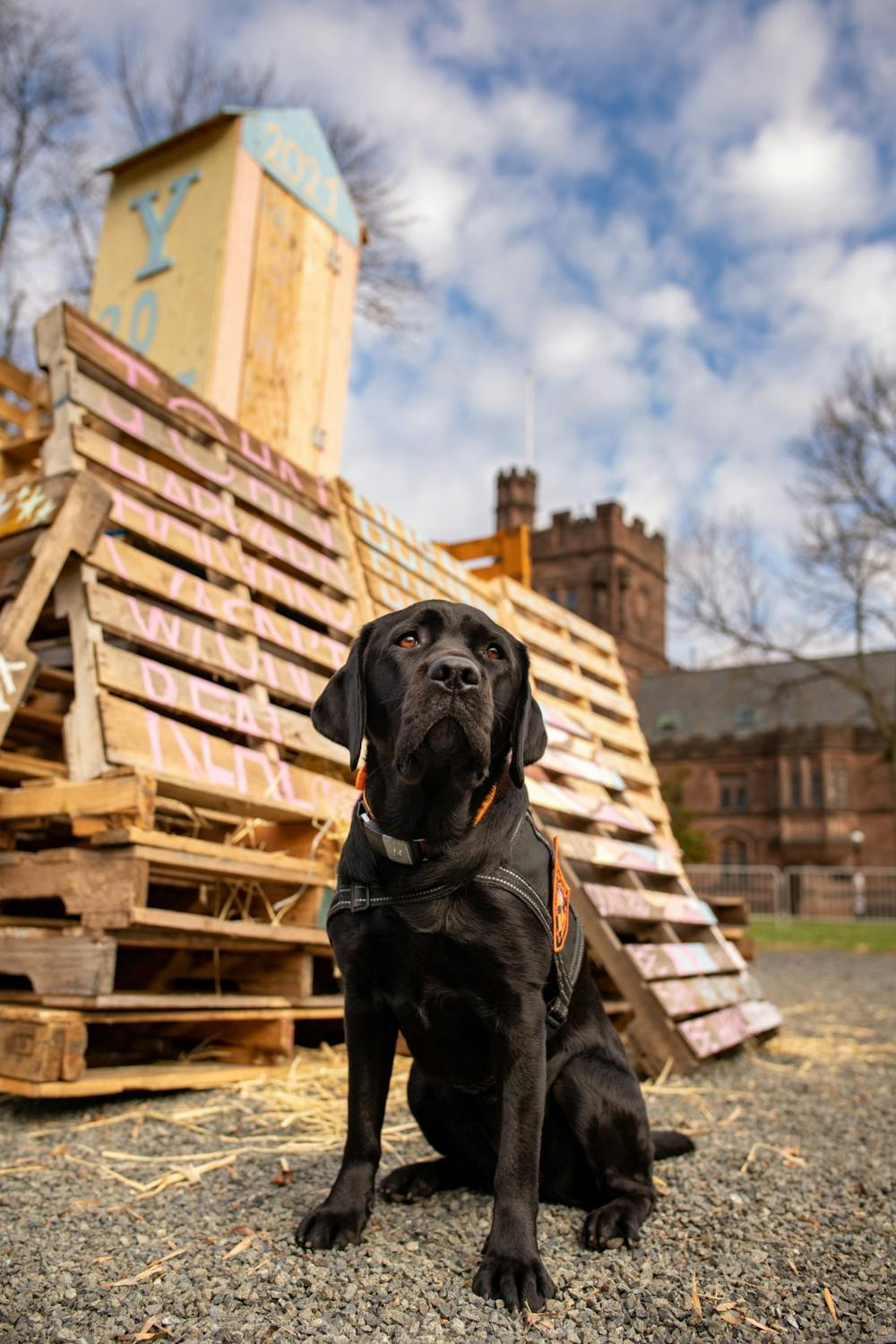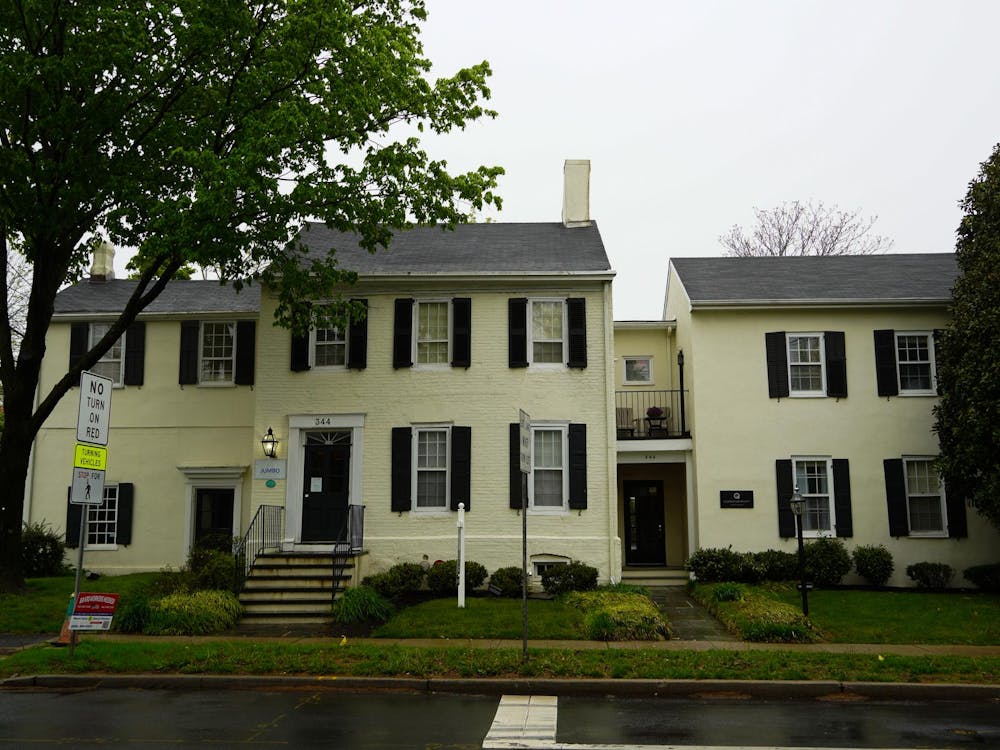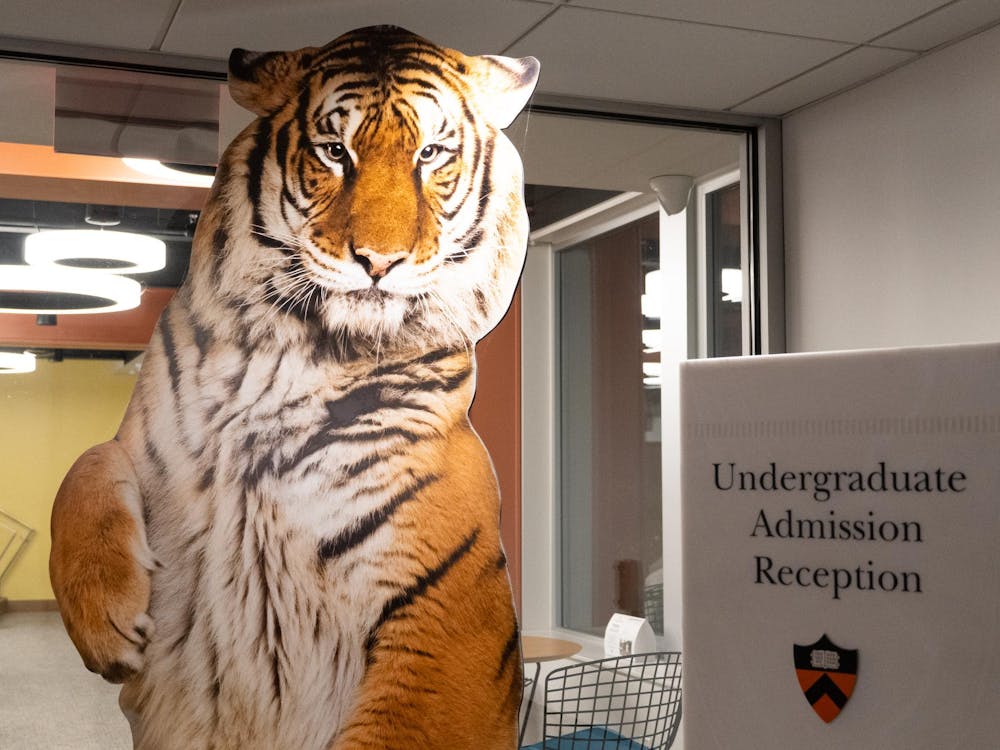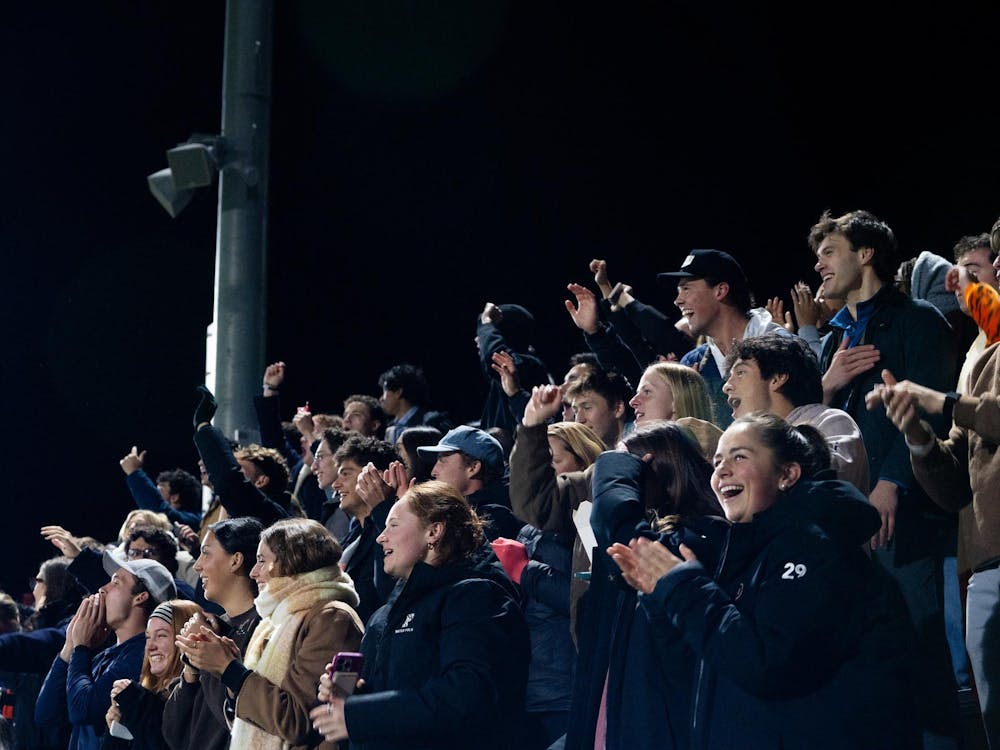“I wanted to be a canine officer — your traditional go-on-patrol with a dog,” said Detective Sergeant Al Flanders, who leads Princeton Public Safety’s detective bureau. “I knew that that narrative wouldn’t fit Princeton — a PSAFE officer [having] a big, ferocious dog walking around. So I thought, how am I going to get a dog into my work?”
So began Flanders’ efforts to subvert the narrative of canine officers and integrate a service dog into PSAFE.
Flanders eventually formed a partnership to bring Coach, a Laborador Retriever raised by prisoners, to campus through an initiative that trains dogs for police departments to act as a bridge with the community. The initiative has reached multiple college campuses, where a community bridge may be helpful. According to a CivicScience poll, only 43 percent of Americans 18-24 were ‘very’ or ‘somewhat’ likely to trust the police, the lowest of any age group. Thus far, Flanders has found success with Coach, noting the positive response on campus.
A partnership between Yale’s Public Safety and Puppies Behind Bars (PBB) in September 2020 inspired Flanders to propose that Princeton adopt a dog via a similar process. PBB supports incarcerated individuals who meet a selection criteria in prisons across New Jersey and New York to raise working dogs for individual handlers. The dogs these prisoners raised have come to Princeton, but also served in other roles including explosive detection.
Such a program, Flanders believed, could “break the ice [among] our community, students, faculty, [and] staff, with all the stuff that’s going on with the bad image of police.”
After three months of research, Flanders submitted a proposal for a “community caretaking canine” to his supervisors at the University, along with an application to PBB. With University approval and acceptance by PBB, Flanders attended a training camp in Westchester County, N.Y. in August 2021. While in New York, Flanders had his first interaction with the female prisoners raising the dogs.
“So I’m a police officer and here I am walking into an all-female prison. Completely out of [my] comfort zone. So I walk in and within the first 10 minutes, I kind of got the vibe these women [puppy raisers] will do anything for me. They really care so much about my ideas and plans on what I want to do with this dog.”
Over the next several days, participants in the camp spent time with multiple dogs on site, including spending time together during daytime exercises and overnight. Ultimately, Flanders found his match — Coach, a black Labrador Retriever with orange eyes.
“It was completely emotional,” Flanders reflected, speaking about his experience and the trainers’ who have been raising the puppies since 8 weeks of age. “We’re going in there to take these dogs from [the raisers], but they understood the need for that.”
Gilbert Molina III, runs the PBB program at the Bedford Hills Correctional Facility, where Coach and Flanders had their graduation. Molina said his experience as a puppy raiser between 2006 and 2010 while sentenced at the Otisville Correctional Facility gave him experience with the “emotional rollercoaster” that many of the people he trains face as the puppies leave the facilities.
“I don’t care what raiser it is. When you’re with that doggy for almost two years and raising him, you become attached. There’s no way around that,” Molina said. “If you’re a dog person, you’re going to love that dog, that dog is going to love you. And when the dog goes to graduate, it is hard. I don’t care, you could be a killer, and you will be watery-eye[d]. If not, you will cry in private.”
Just as Flanders observed, Molina explained that PBB puppy raisers soon overcome the initial sadness and that many are driven to raise new puppies because of their commitment to the organization’s goals.

According to PBB’s founder and president Gloria Gilbert Stoga, these organizational goals are constantly pivoting according to national needs. While PBB started by raising guide dogs for visually impaired individuals, the program transitioned to prepare explosives detection canines in the aftermath of the Sept. 11, 2001 terrorist attacks and would later train dogs to support the physical and emotional needs of military veterans and first responders.
“As America pulled out of conflicts [in Iraq and Afghanistan], George Floyd was murdered. The response, not only in Manhattan, but across cities around the country, was so much antagonism and hatred between communities and police. And I just said to myself, maybe there’s something we can do to help mitigate this mistrust that communities felt towards police and vice versa.”
Gilbert Stoga recognized a need to pivot once again, adding, “A Labrador Retriever could act as a bridge between police and the communities they serve. So I started focusing on [the idea of donating] dogs to police departments, and it was a huge uphill battle.”
PBB’s first police pairing took place in August 2019 with a department in Groton, Conn., and subsequent placements with NYPD helped build momentum for the program. Brown and Harvard have since joined Yale and Princeton in having PBB facility dogs support community relations with their police departments.
At Princeton, Coach’s debut was on move-in day for the Class of 2025. Flanders explained that despite the nerves and pressure he felt, positive feedback reaffirmed his choice to propose bringing Coach to campus.
Flanders remembered being so overwhelmed by a student who told him that he made her day. “[It was] probably one of the most exciting days of her life, leaving her family and venturing on to this cool thing, Princeton University, and my dog made her day. Like how crazy is that?” he said.
Multiple students approached Flanders that day expressing the comfort Coach brought them, giving Flanders confidence that the new PSAFE partnership would work.
Gilbert Stoga shared her thoughts on the success of the partnership, saying, “I think that the presence of Coach does two things. One, it lowers the stress level in general. And two, it makes Princeton University [Public Safety] more accessible to people who otherwise maybe wouldn’t want to go up and talk to a cop.” She also emphasized the benefits of PBB dogs having been raised by inmates in high-stress environments.
Flanders echoed Gilbert Stoga’s assessment, noting that PSAFE is “big on community policing, community caretaking.” He noted that Coach “is probably the most popular person in our department by far,” adding that “mental health is key here. If my dog can change your thoughts for 10 minutes out of your busy day, that’s a win.”
Part of Coach’s appeal stems from the fact that her express purpose is to provide community support, rather than to perform other functions such as drug sniffing. So far, Flanders notes that he has not had any negative experiences with Coach.
“Before, I would be walking through campus and no one would say ‘hi’ to me, even if I was [in] full Public Safety uniform. Now when I walk with her, they want to stop, they want to engage in a conversation. It’s a start of a relationship with Public Safety.”
In addition to daily community walks and visit requests from groups like sports teams and zee groups, Coach provides comfort to students in crisis at the infirmary.
Flanders recalled a conversation with a campus doctor, in which the doctor told him that a girl changed her mind about leaving Princeton because Flanders and his dog came to visit her. “I was like, holy cow. It works,” Flanders remembered reacting.
Coach has also opened avenues for collaboration between PSAFE and other established campus organizations, noted Liz Erickson, who directs the Office of Disability Services and AccessAbility Center at Princeton. The AccessAbility Center has hosted therapy and seeing eye dog programming since it opened in 2017, with student fellows organizing these events during the periods leading up to midterms and final exams.
While Erickson says she was not aware of plans to bring Coach to campus until after the fact, she is a supporter of Flanders’ work.
“The Office of Disability Services has a connection with Public Safety for different reasons, but we really did not collaborate with Public Safety on any events at the Accessibility Center before Coach came to campus,” Erickson explained.
“[Having Coach] complements what we’re doing. It gives a different type of opportunity for students. We’re always happy to have different options for students to engage with animals. Part of the value is giving Officer Flanders and Coach the opportunity to meet with students in an organized way and for them to understand that we have Coach on campus and why we have Coach on campus. It’s always a learning experience for students,” Erickson continued.
As a self-proclaimed dog-lover, Carrie Geisler ’25 has attended several study breaks with Coach, including at the AccessAbility Center. In the future, Geisler said she hopes to see opportunities for drop-in visiting hours with Coach.
“I think it’s really great. I think animals are really good for mental health to help you destress, calm down. [To] just take a few minutes and pet a really cute dog is always good for taking a break.”
Geisler said that she has not had many interactions with PSAFE and so could not comment on any changes as a result of Coach. Still, she noted, “I feel like [Coach is] very beloved by the campus community and everyone that knows of her. It’s always great when they have these [study breaks].”
Coach’s presence continues to expand, with 2,445 followers and counting on her Instagram account, run by Flanders’ 15-year-old daughter. In recent months, PSAFE has started giving out Coach merchandise, and both Coach and Flanders were announced as honorary members of the Class of 1962.
Regardless of future initiatives, including the possibility of having more dogs join the PSAFE team, Flanders shared that Coach has already exceeded his expectations. “She’s fulfilled everything that I could ever imagine.”
Sejal Goud is the associate Features editor for the ‘Prince.’
Please direct any corrections requests to corrections[at]dailyprincetonian.com.








